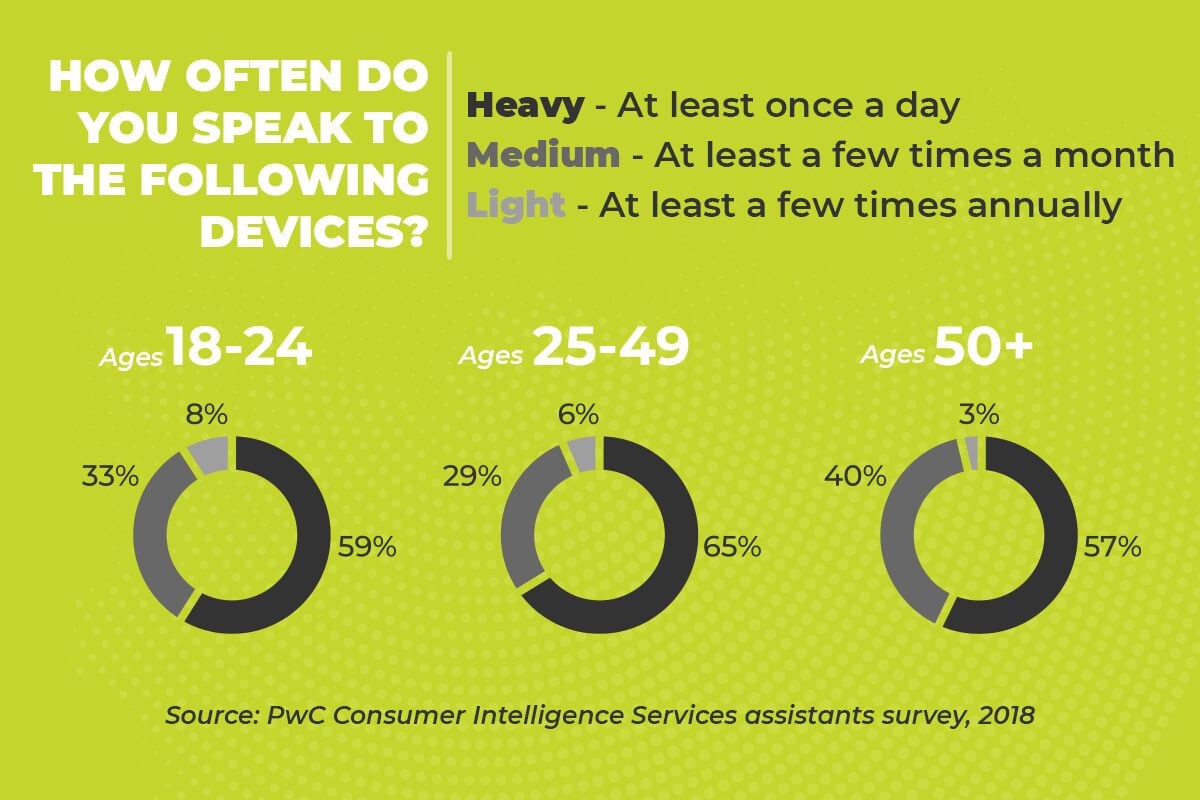“Alexa, How Do I Optimize My Senior Living Website for Voice Search?”
August 10, 2021

“Alexa, what is a normal blood pressure range?” “Okay, Google, how much water should my 80-year-old mother drink each day?” “Hey, Siri, what is the difference between assisted living and independent living?”
These are all examples of voice search: an easy way to find answers and search the web using just your voice. Voice search and compatible devices have exploded in recent years, changing the way we search and explore the internet. This evolution of search has impacted the way businesses must optimize their websites to show up in search results and not miss out on traffic.
What does this mean for your website, though? How do you optimize it for voice search? Markentum is a digital marketing agency that focuses on search engine optimization (SEO) and related strategies. We’re taking a look at how you can keep up with the changing times and optimize your senior living website for voice search.
What is Voice Search?
Voice search is no longer just an innovative fad; it’s becoming ubiquitous. A recent survey estimated that just about 40% of internet users use a voice assistant—whether at home, in the car, or even on their person. People use voice search because it’s fast, hands-free, and gives you an answer with no scrolling or clicking multiple links.
These digital voice assistants (Apple’s Siri, Google Assistant, and Amazon Alexa lead the market) keep getting smarter over time, going from simply listening to understanding, answering complex questions, inferring context, and suggesting further actions based on past searches. For example, you could ask your voice assistant, “What were The Beatles’ top songs in the 1970s?”, and it would be able to:
- Know that you are referring to the band, not the insect
- Find answers from a specific point in time
- Suggest that they play one of these songs for you
Pretty cool, right?

How Does Voice Search Impact Search Results?
Few people type the way they speak, especially when it comes to searching for something online. Take these two searches:
→ Type: “golf course near me”
→ Voice: “What are some of the best golf courses in my area?”
→ Type: “dementia symptoms”
→ Voice: “What are the early symptoms of dementia or memory loss?”
As you can see, voice search is much more conversational, meaning that digital assistants need to understand inflection, complex questions, and semantics—the meaning of words and phrases. This also impacts search engine optimization in a significant way. In the past, SEO was focused heavily on keywords, and now, while keywords are still important, it’s more about providing the user with the right answer at the right time in the right place.
How to Optimize for Voice Search
Even though it may seem like a major shift in SEO strategy, businesses and senior living communities can optimize their websites for voice search using some simple techniques.
1. Know Your Users
Before you focus all your efforts and attention on voice search, it’s critical to know whether or not your audience even uses this feature. According to a 2018 report by PwC, 25-49-year olds use voice assistants most often, but still, 57% of those over 50 are considered “heavy” users (using voice search at least once a day).
Having accurate data and insights on your users’ search behavior and device type can help you better understand how or if your audience uses voice search. Markentum offers these insights to our partners, helping them determine where best to focus their search engine optimization efforts.
2. Location, Location, Location
According to Search Engine Watch, “mobile voice-related searches are 3X more likely to be local-based than text (Search Engine Watch).” This means that optimizing your senior living website for local search is essential. These local searches are from people looking for convenient solutions near them. Here are several ways to enhance your local SEO:
- Ensure your website has a unique experience for both mobile and desktop users.
- Claim your Google My Business listing and ensure everything is accurate and updated.
- Include location-based terms (neighborhoods, surrounding towns) in your content and metadata.
Reference local landmarks, attractions, and conveniences in your content.
3. Focus on Long-Tail Keywords
The difference between long-tail keywords versus short-tail keywords can be seen in our previous example: “dementia symptoms” vs. “What are the early symptoms of dementia or memory loss?” Long-tail keywords are the more conversational queries most likely performed on voice. Including these more natural, human phrases as focused keywords can help in your overall efforts.
Ongoing blog efforts can help you address these long-tail keywords and questions while creating an educational library for your visitors and customers.
4. Who, What, When, Where, Why
If you haven’t noticed by now, the main difference between type search and voice search is that voice search is typically in the form of a question since your digital assistant will provide an immediate answer. To capitalize on this, it can be a great idea to include an FAQ page on your website, incorporating these questions as long-tail keywords. For example, your senior living website can consist of questions that voice searchers might ask:
→ How much does senior living cost?
→ What’s the difference between independent living and assisted living?
→ What is memory care?
→ What services are included in senior living?
Including these questions (and answers) on your website can not only make you a good industry resource but can increase your chances of being used as a voice assistant’s top answer.
Voice Search is Here to Stay
While search and SEO are constantly evolving, one thing is certain: voice search is not going anywhere. It’s no longer ahead of the curve to optimize your website for voice; today, it’s simply crucial in order to grow your organic traffic and increase your leads.
For more guidance on the ever-evolving world of search engine optimization and how to ensure your senior living website is following best practices, we invite you to reach out to Markentum. We are a full-service digital marketing agency with locations in Daytona Beach, Florida, and Colorado Springs, Colorado. Schedule your free consultation to get started!
